05/23/2017
Psychotherapeutic care of refugees in the EU inadequate
International round-table discussion of 23 March 2017 in Berlin hosted by the Federal Chamber of Psychotherapists
The psychotherapeutic care of mentally ill refugees in Europe is inadequate and urgently requires improvement. This was the conclusion of a round-table discussion organised by Germany’s Federal Chamber of Psychotherapists (BPtK) on 23 March 2017 in Berlin, which was attended by experts from nine different European countries and a representative of the European Commission.
BPtK Vice-President Dr Nikolaus Melcop, reported in his introductory address that a survey conducted by the BPtK concerning the psychotherapeutic care of refugees in Europe had made it easier to describe the situation in each country more precisely and to assess it better. Thus, it is now possible to take not only national steps but to make political demands at the European level. In his welcoming address, Tomáš Zdechovský, a member of the European Parliament, called for the creation of a common framework to ensure the mental health of refugees.
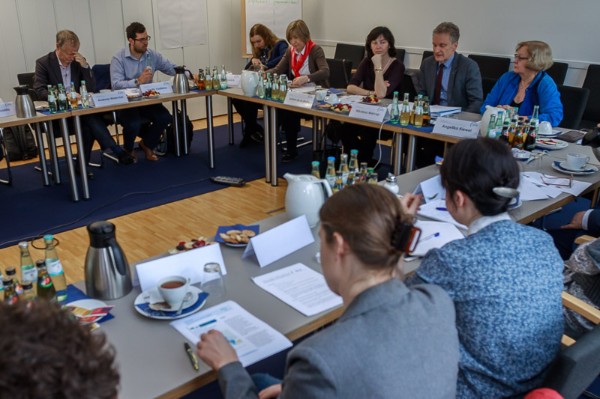
EU health policy and refugees
Isabel de la Mata from the European Commission began by outlining the European legal conditions that are relevant to a stronger commitment to refugees. According to the treaties, health care is fundamentally a matter for Member States and does not fall within the jurisdiction of the European Union (EU). On the other hand, joint decisions regarding migration is very much a matter of EU jurisdiction. It has hence established a regulatory framework for the provision of health care to refugees.
Within the context of the EU, migrants and refugees are those persons who are not residents of any European state. Thus, EU citizens living in another European Member State are not considered migrants. There are three distinct groups of migrants: The first group includes persons from third countries, i.e. non-EU Member States, that are not affiliated to the EU through agreements such as the European Free Trade Association (EFTA). These persons enjoy the same rights as the citizens of the respective EU Member State, provided that they are legally residing in the EU.
The second group consists of refugees and stateless persons, however only if they have completed a process by which they have been recognised as refugees. These people also have the same claim to health care as the citizens of the given EU Member State; although their freedom of movement can be restricted, such that, for example, a recognised refugee in Munich might not be allowed to access specialised health care available in Berlin. According to EU directives, however, a refugee’s freedom of movement may not be restricted for more than 18 months.

For EU directives to apply in the Member States, they must be transposed into the national laws of those states. In doing so, Member States are not allowed to adopt a stricter regime than is provided for in the EU Directive, but they may adopt one that is more favourable to refugees. According to the relevant EU Directive, a refugee's place of residence may be restricted to his/her accommodations for up to 18 months. A single EU Member State is therefore not permitted to limit the free movement of refugees for as long as 20 months but may reduce the period to only 2 months.
The third group of migrants within the EU are asylum seekers, for whom “essential treatment” must be provided. However, political opinions among EU Member States are highly divergent about what is “essential” for mental health. All Member States have nonetheless adopted the UN Convention on the Rights of the Child, under which all minors in EU countries are entitled to all “necessary services,” irrespective of their status as citizens or refugees. Yet, according to a study expected to be published in July, only four Member States are currently complying with this Convention regulation.
At the European level, there are no common rules concerning people living illegally in a Member State; rather it basically left to each Member State to decide which health care services such people receive. In particular, refugees from African countries arriving in Italy are assessed as economic refugees and therefore have little chance of obtaining regular residency status; and therefore little chance of receiving adequate health care – unlike Syrian war refugees entering the EU via Greece. In many EU countries, health care services provided by non-governmental organisations is not infrequently the only possibility for refugees suffering from a medical or psychotherapeutic illness to receive adequate assistance.
Italy and Greece have been urging other EU Member States to accept more refugees in order that they be distributed equitably, yet this has hardly occurred. This failure, however, is not only due to an unwillingness among the other Member States to accept refugees, but partly also due to the refugees themselves. Many refugees particularly aim to reach countries where they will have opportunities to be integrated into the labour market and therefore turn down opportunities a stay in economically weaker countries, such as Slovenia or Spain.
The political arrangements in the EU concerning refugees are also shaped by the fact that migration and asylum law is primarily written by the interior ministries of the Member States. However, their attitude toward mental illness has been shaped largely by the question of what mental illness is, in the first place. The prevalent mindset is: “You can’t touch it or see it.” This leads to a focus on infectious diseases, while mental illness gets overlooked.
It is therefore absolutely necessary that lobbying efforts regarding mental illness be strengthened at the European level. In Brussels, there are hundreds of organisations lobbying for improvements concerning physical disorders, but only two mental health associations.
Country reports
Italy (Alberto Zucconi)

Alberto Zucconi is the founder and general secretary of the association of psychotherapeutic schools in Italy. Health services for refugees need to be specifically tailored to them, as in the case of a project underway on Lampedusa. At the European level, psychotherapists need to approach Parliament and the Commission and make clear the importance of further research. With respect to our profession, we should not forget that working with refugees can be difficult and frustrating, and that appropriate training for this work is necessary. He underlines the importance of strengthening the influence of psychotherapists within the EU. In the United States, for example, the American Psychological Association has successfully introduced the subject of mental health into that country’s political consciousness. Psychotherapists should be the first point of contact for questions concerning mental health.
Greece (Christina Popontopoulou)

Christina Popontopoulou works in a Doctors Without Borders rehabilitation facility for torture victims and people who have been subjected to extreme violence. It must not be forgotten that health care is also needed by people who have been staying in Greece for a long time, and that the care they require goes well beyond emergency treatment. A particular problem is the lack of translators for patient care and treatment. This can even lead to doctors being unable to administer emergency medication because they cannot at all communicate with their patients. In this environment, psychotherapy becomes a very remote matter.
Sweden (Aline Braun and Mikaela Lindström)

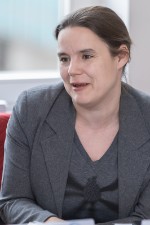
Aline Braun and Mikaela Lindström work in a centre for the treatment of refugees. The situation in Sweden is good, relative to other countries. In principle, refugees have the same access to health care as Swedes. There are, however, problems in implementing this legal claim. Particularly in sparsely populated areas in the north of Sweden, there are hardly any specialised health services available – although some of the family doctors are doing excellent work. Since treating traumatised refugees is such a specialised area of health care, Sweden’s health care system is not as efficient in practice as the law makes it appear. Collaboration with social services is particularly important.
United Kingdom (Alessandro Storer)

Alessandro Storer works for Mind, an organisation that works for better mental health. In particular, it seeks to make the care provided to mentally ill refugees more inclusive, more accessible and culturally competent. In the United Kingdom, mental health is generally considered a part of overall health. One problem, however, is that the European Union Directive of 2013 does not apply in the UK because of an exemption provision; merely, the former directive applies, which provides for more limited rights, thus making it more difficult to treat mental illness, in particular.
In practice, however, an acceptance of the importance of mental illness is still lacking. Another problem is that many of the specialised treatment centres are in London, but refugees are often accommodated in reception facilities outside the city. There is a translation service in the United Kingdom, which can sometimes even offer cultural mediation competency.
Portugal (Jorge Gravanita)

Across the political spectrum, the overwhelming majority of actors have a positive attitude towards measures that welcome refugees. Portugal is not inexperienced with immigration. In recent history, there have been three major waves of refugees: after the Second World War, after the end of Portuguese colonialism in 1974, and after the fall of the Soviet Union. However, during the recent economic crisis, the public health care sector was subject to considerable cost-cutting measures, which have also affected the care of refugees.
Jorge Gravanita presented the country’s PAR network. Within PAR, the Portuguese refugee council collaborate with professional and scientific organisations and local authorities. This network provides a platform for refugees and is active in Portugal and Greece. It offers emergency assistance in refugee camps, takes a multidisciplinary approach and works with the support of non-governmental organisations and official bodies at the local, national and international level. Since September 15, 2015, about 1,200 refugees have arrived, and about 200 more are expected in the coming weeks. Approximately 1,800 refugees are expected before the programme is completed.
Switzerland (Prof Dr Andreas Maercker)
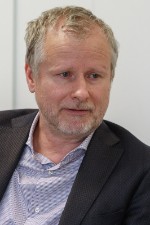
Andreas Maercker is both German and Swiss, and is a professor of psychopathology and clinical intervention at the University of Zurich. He emphasised the work of the Swiss Red Cross in the provision of care to refugees. He also referred briefly to a peculiarity in Switzerland with respect to professional politics: a fifth of practitioners treating mental illnesses are psychiatrists, while four-fifths are psychologists. Yet, it is the psychiatrists who make the decisions concerning essential questions of financing and organisation. It is therefore important to raise the profile of clinical psychologists at the European level and to represent the psychotherapeutic work of psychologists better.
Poland (Iga Jaraczewska and Anna Derwich)
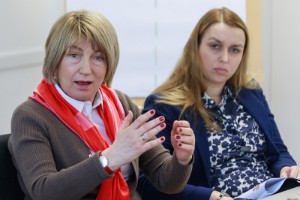
The stream of refugees from Syria has largely flowed past Poland, as the country is not on the Balkan route. Unlike what is sometimes portrayed in the media, Poland, however, has many refugees, in particular from Russia, Tadzhikistan and the Ukraine. A great many of those from the Ukraine, in particular, are suffering from trauma.
The psychotherapeutic care of refugees in Poland needs improvement and must to be expanded. For example, the country’s only reception centre for refugees accommodates 200 people. Once a week, a single psychologist works there for the day. This is completely inadequate.
Cyprus (Dr Vasilis S. Vasiliou)
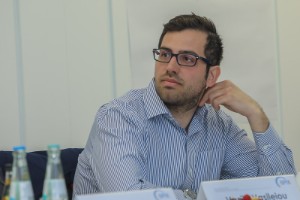
The geographical location of Cyprus makes it one of the easiest places for refugees to reach. Cyprus is only 100 kilometres west of Syria and about 60 kilometres south of Turkey. The first large wave of refugees in recent times occurred between 1975 and 1991 with people fleeing Lebanon and Palestine.
On the island of Cyprus there are two centres operated by the asylum and migration services. One is for persons applying for international protection and the other is a temporary centre for those who have been part of mass displacements and who need international protection. In Cyprus, there are no official epidemiological studies or any other studies that have sought to determine the number of mentally ill refugees in the country. There is also no official centre in Cyprus where refugees would receive psychotherapeutic treatment. Once a week, refugees are examined by two psychiatrists and a clinical psychologist, as well as a psychiatric nurse. Mentally ill refugees are referred to the public health system, but there they encounter long waiting lists, due to inadequate numbers of staff who are qualified to provide the specialised care that refugees require.
Germany (Dr Nikolaus Melcop)
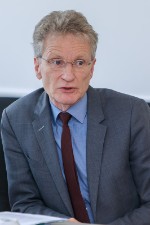
Since early 2014, over 1.5 million refugee minors have sought refuge in Germany. Many of them are traumatised, psychologically burdened or ill, and need help. Yet, the health care they are provided with is far too patchy. In particular, the limited provision of health care contained in Germany’s Asylum Seekers Benefits Act and the lack of funding for language mediation dramatically hamper the ability to provide refugees with adequate care. Over the past two years, solutions for helping refugees better have emerged from many initiatives.
In the view of the BPtK, specialised institutions must be allowed to treat refugees as part of the regular provision of care. There should also be no restrictions with respect to the treatment entitlements of refugees. Necessary translation services must be financed and information should be made available to refugees in the relevant languages, so that they may understand it.
Belgium, Hungary, Netherlands, Ireland and Austria

Dr Angelika Kiewel, European Commissioner of the Federal Chamber of Psychotherapists, summarised the reports from five countries that were unable to send a representative. In Belgium , refugees are provided with psychotherapeutic treatment mainly by the Flemish and Walloon Red Cross. In Hungary , the provision of health care to refugees is limited mainly to emergency treatment and basic medical care; psychotherapy is therefore very rarely employed. In the Netherlands , the care of refugees includes psychotherapy and there are also studies on the subject. Ireland has accepted relatively few refugees. Notable is a programme for providing care and counselling to refugees who have begun a course of studies.
In Austria, ten organizations have joined forces in the area of refugee care and, after years of effort, have submitted a joint application for funding to the European Asylum, Migration and Integration Fund (AMIF), in cooperation with the country’s federal interior ministry The AMIF has provided them with a funding commitment until 2019.
Demands concerning the psychotherapeutic care of refugees
Apart from specific matters regarding the provision of care, the participants of the BPtK round-table discussion on refugee policy agreed on the importance of raising awareness about mental illness in the political debate and strengthening acceptance of it as a key priority that must be addressed. They also agreed that the basic, advanced and further education of specialised therapists must be expedited. Cooperative and collaborative arrangements with respect to various areas beyond the actual treatment of refugees must be improved. It is therefore also necessary that specialised advanced or further training arrangements for health care professionals specialising in the treatment of mental illness be put in place. In addition, the long-term financing of ongoing projects must also be facilitated, as many worthwhile projects are financed only for a short period of time.
Another important aspect is cultural competency. In particular, translators need to be specially trained so that their skills include an understanding of the culture of the refugee group and not just its language. The participants also called for the establishment of minimum standards of treatment.
Finally, for their mental illness to be at all treatable, persons suffering from trauma need to find themselves in a safe and secure living environment. This objective would be supported by a welcoming environment within surrounding communities and within society as a whole. The participants therefore advocated for an anti-stigma campaign to influence social attitudes. However, such a campaign would need to run continuously, rather than just selectively. The participants endorsed “stepped care” concepts, whereby, as a first step, refugees are offered information about self-help in a culturally sensitive manner, and the Internet is incorporated into their care.
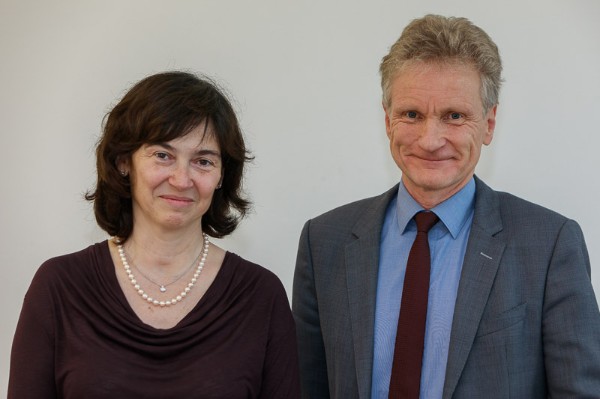
Downloads
Greetings Message - Tomáš Zdechovský (MEP)
Greetings Message - Dr Nikolaus Melcop (BPtK)
Country Reports
- Alberto Zucconi, Italy
- Christina Popontopoulou, Greece
- Aline Braun and Mikaela Lindström, Sweden
- Alessandro Storer, United Kingdom
- Jorge Gravanita, Portugal
- IIga Jaraczewska and Anna Derwich, Poland
- Dr Vasilis S. Vasiliou, Cyprus
- Sonja Kinigadner, Austria
- Belgium, Hungary, Netherlands, Ireland
